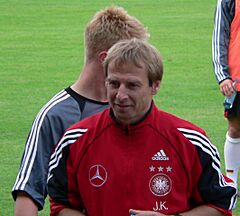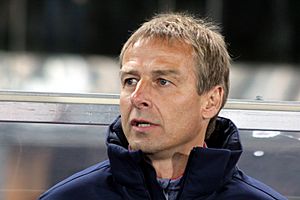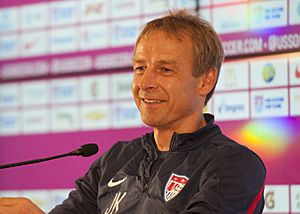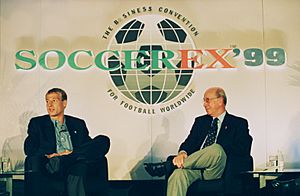Jürgen Klinsmann facts for kids
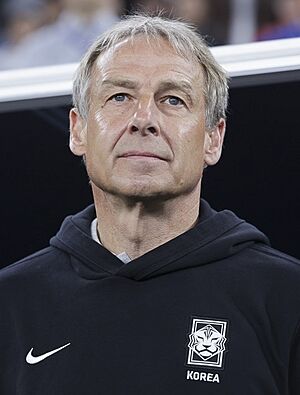
Klinsmann managing South Korea in 2024
|
|||||||||||||||||||||||||||||||||||||||||||||||||||||||
| Personal information | |||||||||||||||||||||||||||||||||||||||||||||||||||||||
|---|---|---|---|---|---|---|---|---|---|---|---|---|---|---|---|---|---|---|---|---|---|---|---|---|---|---|---|---|---|---|---|---|---|---|---|---|---|---|---|---|---|---|---|---|---|---|---|---|---|---|---|---|---|---|---|
| Full name | Jürgen Klinsmann | ||||||||||||||||||||||||||||||||||||||||||||||||||||||
| Date of birth | 30 July 1964 | ||||||||||||||||||||||||||||||||||||||||||||||||||||||
| Place of birth | Göppingen, West Germany | ||||||||||||||||||||||||||||||||||||||||||||||||||||||
| Height | 1.81 m (5 ft 11 in) | ||||||||||||||||||||||||||||||||||||||||||||||||||||||
| Position(s) | Striker | ||||||||||||||||||||||||||||||||||||||||||||||||||||||
| Youth career | |||||||||||||||||||||||||||||||||||||||||||||||||||||||
| 1972–1974 | TB Gingen | ||||||||||||||||||||||||||||||||||||||||||||||||||||||
| 1974–1978 | SC Geislingen | ||||||||||||||||||||||||||||||||||||||||||||||||||||||
| 1978–1981 | Stuttgarter Kickers | ||||||||||||||||||||||||||||||||||||||||||||||||||||||
| Senior career* | |||||||||||||||||||||||||||||||||||||||||||||||||||||||
| Years | Team | Apps | (Gls) | ||||||||||||||||||||||||||||||||||||||||||||||||||||
| 1981–1984 | Stuttgarter Kickers | 61 | (22) | ||||||||||||||||||||||||||||||||||||||||||||||||||||
| 1984–1989 | VfB Stuttgart | 156 | (79) | ||||||||||||||||||||||||||||||||||||||||||||||||||||
| 1989–1992 | Inter Milan | 95 | (34) | ||||||||||||||||||||||||||||||||||||||||||||||||||||
| 1992–1994 | Monaco | 65 | (29) | ||||||||||||||||||||||||||||||||||||||||||||||||||||
| 1994–1995 | Tottenham Hotspur | 41 | (20) | ||||||||||||||||||||||||||||||||||||||||||||||||||||
| 1995–1997 | Bayern Munich | 65 | (31) | ||||||||||||||||||||||||||||||||||||||||||||||||||||
| 1997–1998 | Sampdoria | 8 | (2) | ||||||||||||||||||||||||||||||||||||||||||||||||||||
| 1997–1998 | → Tottenham Hotspur (loan) | 15 | (9) | ||||||||||||||||||||||||||||||||||||||||||||||||||||
| 2003 | Orange County Blue Star | 8 | (5) | ||||||||||||||||||||||||||||||||||||||||||||||||||||
| Total | 514 | (231) | |||||||||||||||||||||||||||||||||||||||||||||||||||||
| International career | |||||||||||||||||||||||||||||||||||||||||||||||||||||||
| 1980–1981 | West Germany U16 | 3 | (0) | ||||||||||||||||||||||||||||||||||||||||||||||||||||
| 1984–1985 | West Germany U21 | 8 | (3) | ||||||||||||||||||||||||||||||||||||||||||||||||||||
| 1987–1988 | West Germany Olympic | 14 | (8) | ||||||||||||||||||||||||||||||||||||||||||||||||||||
| 1987–1998 | West Germany / Germany | 108 | (47) | ||||||||||||||||||||||||||||||||||||||||||||||||||||
| Managerial career | |||||||||||||||||||||||||||||||||||||||||||||||||||||||
| 2004–2006 | Germany | ||||||||||||||||||||||||||||||||||||||||||||||||||||||
| 2008–2009 | Bayern Munich | ||||||||||||||||||||||||||||||||||||||||||||||||||||||
| 2011–2016 | United States | ||||||||||||||||||||||||||||||||||||||||||||||||||||||
| 2019–2020 | Hertha BSC | ||||||||||||||||||||||||||||||||||||||||||||||||||||||
| 2023–2024 | South Korea | ||||||||||||||||||||||||||||||||||||||||||||||||||||||
|
Medal record
|
|||||||||||||||||||||||||||||||||||||||||||||||||||||||
| *Club domestic league appearances and goals | |||||||||||||||||||||||||||||||||||||||||||||||||||||||
Jürgen Klinsmann (born 30 July 1964) is a German football manager and former player. He played as a striker for many famous clubs in Europe. These included VfB Stuttgart, Inter Milan, Monaco, Tottenham Hotspur, and Bayern Munich.
Klinsmann was a key player for West Germany when they won the 1990 FIFA World Cup. He also helped the German team win the UEFA Euro 1996.
After his playing career, Klinsmann became a coach. He led the German national team to a third-place finish at the 2006 FIFA World Cup. He also coached Bayern Munich and the United States national team.
Many people consider Klinsmann one of Germany's best strikers from the 1990s. He scored goals in all six major international tournaments he played in for Germany. In 1995, he was ranked third for the FIFA World Player of the Year award. In 2004, he was named in the FIFA 100 list of the "125 Greatest Living Footballers." In 2016, he became the fifth player to be named an honorary captain of Germany.
Contents
Playing Career Highlights
Early Years and First Clubs
Jürgen Klinsmann is one of four sons. His father was a master baker. Jürgen started playing football at age eight for TB Gingen, an amateur club. Six months later, he scored 16 goals in one game!
At age ten, he moved to SC Geislingen. When he was 14, his family moved to Stuttgart. He then signed with Stuttgarter Kickers. His parents wanted him to finish his baker apprenticeship first, which he did in 1982.
Rising Star in Germany
Klinsmann began his professional career in 1982 with Stuttgarter Kickers, which was in the second division. By the 1983–84 season, he had scored 19 goals.
In 1984, Klinsmann joined first division club VfB Stuttgart. In his first season, he scored 15 goals. He scored 16 goals in each of the next two seasons. In the 1987–88 season, he was the Bundesliga's top goalscorer with 19 goals. He even scored a famous overhead kick against Bayern Munich.
In 1988, Klinsmann was named German Footballer of the Year. After reaching the 1988–89 UEFA Cup final with Stuttgart, he moved to Inter Milan in Italy. He joined two other German players there, Lothar Matthäus and Andreas Brehme.
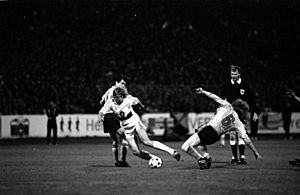
Success in Italy and France
At Inter Milan, Klinsmann quickly became popular. He learned Italian and scored 13 goals in his first season. The next season, he helped Inter win the 1990–91 UEFA Cup.
After UEFA Euro 1992, Klinsmann moved to Monaco in France. He helped the club finish second in the league in his first season. Monaco then reached the semi-finals of the 1993–94 UEFA Champions League.
Becoming a Fan Favorite in England
In 1994, Klinsmann joined Tottenham Hotspur in the Premier League. Fans and media were unsure about him at first. But on his first game, he scored and celebrated by diving to the ground. This funny celebration quickly made him a fan favorite.
He became very popular in England because of his humor and strong playing style. Over 150,000 of his shirts were sold! He scored 21 goals in the 1994–95 season for Spurs. He also won the 1995 Football Writers' Association Footballer of the Year award.
Later Club Years
Klinsmann then played for Bayern Munich in Germany. He was the club's top goalscorer for two seasons. He won the 1995–96 UEFA Cup with Bayern, scoring a record 15 goals in that competition. A year later, he also won the German championship.
He briefly played for Sampdoria in Italy. Then he returned to Tottenham Hotspur in 1997. His goals helped save the club from being relegated (moving down to a lower league). He scored four goals in one match against Wimbledon. He played his last high-level club game in 1998.
In 2003, after retiring, Klinsmann played for an amateur team in the United States called Orange County Blue Star.
International Football for Germany
On 12 December 1987, Klinsmann played his first game for the West German national team. He was a very important part of the West German team that won the 1990 FIFA World Cup. In the Round of 16, Germany played the Netherlands. Klinsmann scored the first goal and played an amazing game.
After more wins, Germany beat Argentina 1–0 in the final to become world champions. Klinsmann was fouled in that game, which led to an Argentinian player being sent off. His last international tournament was the 1998 FIFA World Cup. Germany reached the quarter-finals but lost to Croatia.
Coaching Career
Leading Germany
On 26 July 2004, Klinsmann became the head coach of the German national team. He wanted to make big changes to the team. He brought in Oliver Bierhoff to help with public relations. He also focused on bringing in younger players.
Before the 2006 FIFA World Cup, some fans and media criticized Klinsmann because of poor results. But during the World Cup, Germany played very well. They won all their group games. They beat Sweden 2–0 in the knockout stage. In the quarter-finals, they beat Argentina in a penalty shootout.
Germany lost a close semi-final match to Italy 2–0 in extra time. But they won the third-place play-off against Portugal 3–1. The team's strong performance made fans proud and improved Germany's reputation in football. Klinsmann was given an award for his success.
After the World Cup, Klinsmann decided not to continue as coach. He said he wanted to spend more time with his family. His assistant, Joachim Löw, became the new head coach.
Coaching Bayern Munich
In January 2008, Klinsmann was announced as the new coach for Bayern Munich. He tried to modernize the club's training and structure. However, Bayern started the season poorly. Klinsmann faced pressure after some big losses.
Bayern reached the quarter-finals of the 2008–09 UEFA Champions League. But they lost badly to Barcelona. Klinsmann was fired on 27 April 2009, with five matches left in the season. Bayern was in third place at that time.
Coaching the United States
On 29 July 2011, Klinsmann became the head coach of the United States national team. Early on, the U.S. team had some tough friendly games. But on 29 February 2012, they won a historic 1–0 victory against Italy. On 15 August 2012, Klinsmann led the U.S. to their first ever win against Mexico at the Estadio Azteca.
In 2013, Klinsmann guided the U.S. team to win their fifth 2013 CONCACAF Gold Cup title. They beat Panama 1–0 in the final. On 10 September 2013, the United States qualified for the 2014 FIFA World Cup.
2014 World Cup Journey
Klinsmann made some surprising choices for the 2014 World Cup squad. He included several players who were born and trained in Germany but had American fathers. He also famously left out Landon Donovan, a top U.S. scorer.
On 16 June, the U.S. beat Ghana 2–1 in their first World Cup match. They then drew 2–2 with Portugal. The U.S. lost 1–0 to Germany in their final group game. But they still made it to the Round of 16.
In the Round of 16, the U.S. played Belgium. U.S. goalkeeper Tim Howard made many amazing saves. The game went to extra time, where Belgium scored two quick goals. Julian Green scored for the U.S., but they couldn't find another goal and were eliminated.
Later Years with the U.S. Team
In 2015, Klinsmann led the U.S. to friendly victories over the Netherlands and Germany. However, the U.S. finished fourth in the 2015 CONCACAF Gold Cup, which was their worst performance since 2000.
In November 2016, the U.S. lost two important World Cup qualification matches. After these losses, Klinsmann was fired on 21 November 2016. The U.S. team ultimately did not qualify for the 2018 FIFA World Cup.
Hertha BSC and South Korea
On 27 November 2019, Klinsmann became the manager of Hertha BSC in Germany. However, he stepped down after only ten weeks.
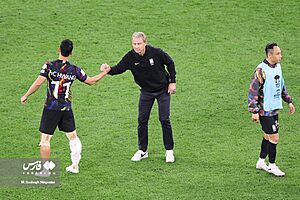
On 27 February 2023, Klinsmann was named head coach of South Korea. He was criticized by South Korean fans for spending a lot of time outside South Korea. During the 2023 AFC Asian Cup, South Korea had some difficult games. They lost to Jordan 2–0 in the semi-final. On 16 February 2024, the Korea Football Association fired Klinsmann.
Charity Work and Social Causes
In 1995, Klinsmann and his friends started a children's charity called Agapedia. The name means "Love for Children" in Greek. In 1997, as captain of the German national team, Klinsmann visited the Holocaust memorial Yad Vashem in Israel. This visit was shown worldwide.
Klinsmann also supports an initiative called "Learning for the future." This group helps educate young people about the Holocaust. In 1999, Klinsmann donated over $1 million from his farewell match to children's charities.
Personal Life
Klinsmann was born in Göppingen, Germany. His family moved to Stuttgart when he was a teenager. His family owns a bakery in Stuttgart. Because of this, he is sometimes called the "baker's son from Botnang." Klinsmann is a trained baker himself.
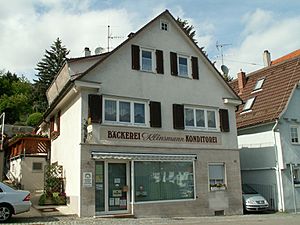
He is married to Debbie Chin, an American former model. They got married in 1995. Klinsmann lives in Huntington Beach, California, with his wife and two children. His son, Jonathan, is a goalkeeper and has played for the U.S. U-20 team.
Besides German, Klinsmann speaks English, Italian, and French. He is also a certified commercial helicopter pilot. He is now a U.S. citizen. Klinsmann has also worked as a football expert for TV channels like ESPN and BBC Sport.
In April 2023, Klinsmann was a special guest at a ceremony in Berlin. Former German Chancellor Angela Merkel received a high honor, and Klinsmann was there to celebrate with her.
Honors and Awards
As a Player
- UEFA Cup: 1990–91 (with Inter Milan), 1995–96 (with Bayern Munich)
- Bundesliga: 1996–97 (with Bayern Munich)
- FIFA World Cup: 1990 (with West Germany)
- UEFA European Championship: 1996 (with Germany)
- Olympic Games: Bronze medal 1988 (with West Germany)
- German Footballer of the Year: 1988, 1994
- Football Writers' Association Footballer of the Year: 1994–95
- Bundesliga top scorer: 1987–88
- UEFA Cup top scorer: 1995–96
- FIFA 100 (named one of the greatest living footballers)
As a Manager
- FIFA World Cup: Third place 2006 (with Germany)
- FIFA Confederations Cup: Third place 2005 (with Germany)
- CONCACAF Gold Cup: 2013 (with United States)
- German Football Manager of the Year: 2006
- CONCACAF Coach of the Year: 2013
See also
 In Spanish: Jürgen Klinsmann para niños
In Spanish: Jürgen Klinsmann para niños
 | DeHart Hubbard |
 | Wilma Rudolph |
 | Jesse Owens |
 | Jackie Joyner-Kersee |
 | Major Taylor |


